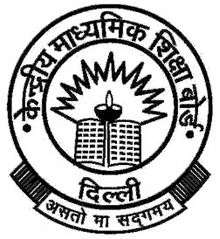Central Board of Secondary Education
|
Logo | |
| Abbreviation | CBSE |
|---|---|
| Formation | 3 November 1962 |
| Type | Governmental Board of Education |
| Headquarters | New Delhi, India |
| Location |
|
Official language | Hindi & English |
Chairman | Rakesh Kumar Chaturvedi |
Parent organisation | Ministry of Human Resource Development |
| Website | www.cbse.nic.in |
The Central Board of Secondary Education (abbreviated as CBSE) is a Board of Education for public and private schools, under the Union Government of India. Central Board of Secondary Education (CBSE) has asked all schools affiliated to follow only NCERT curriculum.[1]
History
The first education board to be set up in India was the Uttar Pradesh Board of High School and Intermediate Education in 1921, which was under jurisdiction of Rajputana, Central India and Gwalior. In 1929, the government of India set up a joint Board named "Board of High School and Intermediate Education, Rajputana". This included Ajmer, Merwara, Central India and Gwalior. Later it was confined to Ajmer, Bhopal and Vindhya Pradesh. In 1952, it became the "Central Board of Secondary Education".
Affiliations
CBSE affiliates all Kendriya Vidyalayas, all Jawahar Navodaya Vidyalayas, private schools and most of the schools approved by central government of India.
Examinations
CBSE conducts the final examinations for Class 10 and Class 12 every year in the month of March. The results are announced by the end of May.[2] The board earlier conducted the AIEEE Examination for admission to undergraduate courses in engineering and architecture in colleges across India. However the AIEEE exam was merged with the IIT-Joint Entrance Exam (JEE) in 2013. The common examination is now called JEE(Main).
CBSE also conducts AIPMT (All India Pre Medical Test) for admission to major medical colleges in India. In 2014, the conduct of the National Eligibility Test for grant of junior research fellowship and eligibility for assistant professor in institutions of higher learning was outsourced to CBSE.[3] Apart from these tests, CBSE also conducts the central teachers eligibility test and the Class X optional proficiency test.[3] With the addition of NET in 2014, the CBSE has become the largest exam conducting body in the world.[3][4]
Regional offices
Presently CBSE has 10 regional offices:[5]
- Delhi: NCT of Delhi, Foreign Schools
- Chennai: Tamil Nadu, Andhra Pradesh, Telangana, Maharashtra, Goa, Puducherry, Andaman and Nicobar Islands, Daman and Diu
- Guwahati: Assam, Nagaland, Manipur, Meghalaya, Tripura, Sikkim, Arunachal Pradesh, Mizoram
- Ajmer: Rajasthan, Gujarat, Madhya Pradesh, Dadra and Nagar Haveli
- Panchkula: Haryana, Union Territory of Chandigarh, Punjab, J&K, Himachal Pradesh
- Allahabad: Uttar Pradesh, Uttarakhand
- Patna: Bihar, Jharkhand
- Bhubaneswar: West Bengal, Odisha, Chhattisgarh
- Thiruvananthapuram: Kerala, Lakshadweep, Karnataka
- Dehradun: Uttar Pradesh, Uttarakhand
See also
- Council for the Indian School Certificate Examinations (CISCE)
- National Institute of Open Schooling (NIOS)
- Secondary School Leaving Certificate (SSLC)
- Board of Secondary Education, Madhya Pradesh (MPBSE)
- Boards of Education in India
References
- ↑ "Only NCERT books at all CBSE schools".
- ↑ "CBSE Results Announcement Dates: Class 12 on May 25, Class 10 on May 27". news.biharprabha.com. 23 May 2015. Retrieved 23 May 2015.
- 1 2 3 "After UGC's failure, CBSE to conduct NET". Retrieved 24 July 2014.
- ↑ "NET to be held under CBSE’s watch". The Hindu. Retrieved 24 July 2014.
- ↑ "Contacts". CBSE. Retrieved 2016-12-03.
External links
| Wikimedia Commons has media related to Central Board of Secondary Education. |
